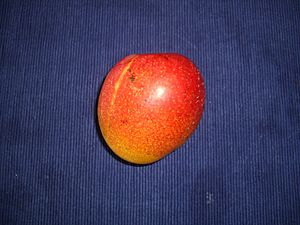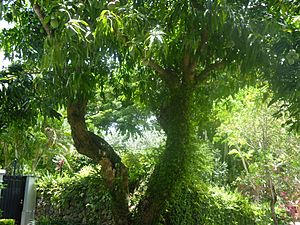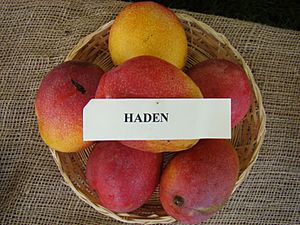Haden (mango) facts for kids
Quick facts for kids Mangifera 'Haden' |
|
|---|---|
 |
|
| Genus | Mangifera |
| Species | Mangifera indica |
| Cultivar | 'Haden' |
| Origin | Grown from a Mulgoba mango seed planted in Coconut Grove, Florida in 1902. |
The Haden' mango is a very famous type of mango. It became one of the most popular mangoes grown worldwide. This happened after it was first introduced in south Florida in the early 1900s. The 'Haden' mango later became the parent for many other mango types developed in Florida.
The Story of the Haden Mango
In 1902, a retired U.S. army officer named Captain John J. Haden lived in Coconut Grove, Florida. He planted four dozen seeds from 'Mulgoba' mangoes. He had bought these seeds from Professor Elbridge Gale. The professor lived near Lake Worth Lagoon in the area now known as West Palm Beach.
Captain Haden passed away the next year. But his wife, Florence Haden, continued to care for the mango trees. The trees grew on their property in Coconut Grove. In 1910, the trees started to produce fruit. One tree, in particular, grew amazing mangoes. They had a beautiful color and tasted very good. This special mango type was chosen and named 'Haden' after the family. Experts believe the 'Haden' mango likely came from a mix of 'Mulgoba' and 'Turpentine' mangoes.
Florence Haden saw how special this mango was. She told the Florida State Horticultural Society about its success. She also sent samples of the fruit to the United States Department of Agriculture. Another large mango went to Edward Simmonds. He worked at the Plant Introduction Station in Miami. Simmonds was very interested in the 'Haden' mango. He soon started growing it widely in south Florida.
The 'Haden' mango became a huge success for businesses. This was largely because a nursery owner named George Cellon grew many of them. The 'Haden' mango was the most important mango in Florida for about 25 years. It was also grown successfully in other places. These included Honduras, Hawaii, and Australia.
Over time, the 'Haden' mango became less popular for large farms. This was due to problems with fungus and sometimes not producing enough fruit. Also, the fruit could have internal issues, like "jelly seed." Newer mango types with better features also became available. However, most of the mango varieties later created in Florida came directly or indirectly from the 'Haden' mango.
Many named mango varieties are thought to be direct descendants of the 'Haden' mango. These include:
- Allen-King/Everbearing
- Anderson (a mix of Haden and Sandersha)
- Bailey's Marvel (a mix of Haden and Bombay)
- Becky (a mix of Haden and Brooks)
- Cogshall
- Cushman (a mix of Haden and Amini)
- Earlygold
- Edward
- Fascell (a mix of Haden and Brooks)
- Glenn
- Hatcher (a mix of Haden and Brooks)
- Hodson
- Jacquelin (a mix of Haden and Bombay)
- Kent (a mix of Haden and Brooks)
- Irwin (a mix of Haden and Lippens)
- Lippens
- Osteen
- Palmer
- Parvin
- Ruby
- Sensation (a mix of Haden and Brooks)
- Southern Blush (a mix of Haden and Cushman)
- Spirit of '76 (a mix of Haden and Zill)
- Springfels
- Tommy Atkins
- Torbert
- Valencia Pride
- Van Dyke
- Winters (a mix of Haden and Ono)
- Zill (a mix of Haden and Bombay)
Even though it's not a top commercial mango anymore, the 'Haden' mango has remained popular. Many people still grow it in their homes and nurseries. The original 'Haden' tree still stands in Coconut Grove today.
'Haden' trees are also part of important collections. These include the USDA's plant collection in Miami, Florida. They are also at the University of Florida's Tropical Research and Education Center in Homestead, Florida. You can also find them at the Miami-Dade Fruit and Spice Park, also in Homestead.
What the Haden Mango Looks Like
The 'Haden' mango is known for its bright color and good taste. It is a medium to large-sized fruit. When ripe, it often has a beautiful red blush with yellow and green tones. The flesh inside is usually firm and has a sweet, rich flavor.
 | Madam C. J. Walker |
 | Janet Emerson Bashen |
 | Annie Turnbo Malone |
 | Maggie L. Walker |



